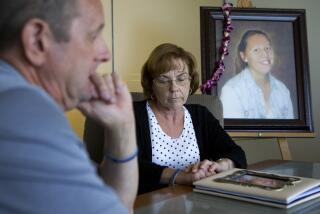In Film by Right-to-Die Advocates, Last Wishes Come First
- Share via
You probably know someone who’s said it. Perhaps you’ve said it yourself.
I don’t want a slow, painful death. When the time comes, I want to die on my own terms.
The question is: Could you end your own life?
An even tougher question: Could you help someone you love do it?
A North Carolina freelance journalist will be in Southern California this weekend for the premiere of a 55-minute film he helped make of his father’s final months, up to and including his suicide from an overdose of pills.
Making the documentary all the more poignant, Jay Niver says, is that he and his twin, Gretchen, were with their father, Sam Niver, as he ended his own life in June 1998 rather than continue fighting prostate cancer.
Titled “Live and Let Go--An American Death” and shot with longtime family friend and filmmaker Jay Spain, the documentary will premiere at 1 p.m. Sunday at the DancesWithFilms festival at the Laemmle’s theater in Santa Monica. Sam Niver was a member of the Hemlock Society, a national organization that supports physician-assisted suicides. Jay Niver says his father tried but failed to get a physician to assist him.
While the film deals mostly with reminiscences and moments from Sam Niver’s life, it is intended to focus attention on the controversial right-do-die movement. Oregon is the only state that provides for physician-assisted suicides, but U.S. Atty. Gen. John Ashcroft has publicly stated his opposition and the controversy has reheated.
In its broadest terms, the issue is simple: Should a terminally ill person, in concert with a physician, have the right to end his or her life?
Orange County has one of the state’s four Hemlock Society chapters, and board member Ralph Wiens of Laguna Niguel says it has about 400 members. Niver’s film has been touted within the organization, Wiens says, but he adds wryly: “The Hemlock Society [in Orange County] is loaded with a bunch of old guys. Going 70 miles to Santa Monica for a movie might be too much.”
Wiens, 73, says local membership spiked a bit after Ashcroft’s denunciation of the Oregon law. The movement’s emphasis, Wiens says, “is just to shorten the dying process, to make it a pleasant event
Jay Niver and Spain recorded 22 hours of interviews with Sam Niver, who was 76 when he died.
“He planned to have a close friend sit with him for moral support,” Niver says. “My sister and I said, ‘No way. We should be the ones to sit and hold your hand, not a friend.’ ”
Niver says his father was hoping they’d offer but had been unwilling to ask them. The elder Niver had told his children (he had another son who was not present at his suicide) several months before his death of his plans, Jay Niver says.
“He felt very strongly about physician-assisted suicide,” Niver, 49, says. “He wanted to make a statement about it and asked me if I wanted to write a story.”
Niver balked but wanted to memorialize his father with the video. “Sixty percent to 65% of it is about him growing up,” Niver says. “The other 35% to 40% is about dying with dignity.”
Niver contacted me after learning about my own father’s long bout with heart and kidney disease. I told Niver I didn’t know if I’d have been able to witness my father’s suicide, no matter how despairing family members had gotten over his declining health and quality of life.
But what if Dad had asked? What if he’d pressed me to help?
I’m glad he didn’t, but even if I’d said no, it wouldn’t have been on philosophical grounds. I can’t make an argument for continued suffering and the attendant indignity that often comes with a protracted and terminal illness.
“We can take care of the pain, we can empty bed pans, but what can we do to restore dignity to an individual who wants autonomy?” Niver asks. “That’s the one thing critics can’t answer. They try to define quality of life for the other person.”
*
Dana Parsons’ column appears Wednesdays, Fridays and Sundays. Readers may reach Parsons at (714) 966-7821, at The Times’ Orange County edition, 1375 Sunflower Ave., Costa Mesa, CA 92626 or dana.parsons @latimes.com.
More to Read
Sign up for Essential California
The most important California stories and recommendations in your inbox every morning.
You may occasionally receive promotional content from the Los Angeles Times.










